1. Rio de Janeiro: Known for its iconic Christ the Redeemer statue, Copacabana and Ipanema beaches, and vibrant Carnival celebrations, Rio de Janeiro is one of Brazil's most famous destinations.
2. São Paulo: Brazil's largest city offers a dynamic urban experience with a thriving arts scene, diverse cuisine, and a bustling nightlife.
3. Salvador: The capital of Bahia is known for its rich Afro-Brazilian culture, historic Pelourinho district, and lively music and dance traditions.
4. Iguazu Falls: Located on the border with Argentina, Iguazu Falls is a breathtaking natural wonder with a series of stunning waterfalls surrounded by lush rainforests.
5. Manaus: In the heart of the Amazon rainforest, Manaus is a gateway for exploring the jungle, including visits to the Meeting of Waters and Anavilhanas Archipelago.
The best time to visit Brazil is between November and March. These are the warmest months across the country, with temperatures between 27°C and 33°C — perfect for enjoying New Year and Carnival celebrations.
• Public Transportation:
Bus: Public buses are a common mode of transportation in Brazilian cities. Prices vary by city but are generally affordable, with fares typically ranging from BRL 4 to BRL 6 (approximately $0.70 to $1).
Metro: Major cities like São Paulo and Rio de Janeiro have metro systems. Metro fares are also usually around BRL 4 to BRL 6 (approximately $0.70 to $1) per ride.
Local Trains: Some cities have local train services with similar fare ranges.
• Taxis: Taxis are available in urban areas, and fares vary by city. In major cities like São Paulo and Rio de Janeiro, the initial fare is around BRL 5 to BRL 6 (approximately $0.90 to $1), with additional charges based on distance.
• Ride-Sharing Services: Services like Uber and Lyft are available in many Brazilian cities. Fares are competitive and often lower than traditional taxis.
• Car Rentals: Renting a car is an option for travelers who want to explore more remote areas. Rental prices vary depending on the type of vehicle and rental duration. On average, daily rental costs can range from BRL 80 to BRL 200 (approximately $14 to $35).
• Domestic Flights: Brazil is a vast country, and domestic flights are common for long-distance travel. Flight prices depend on the route and airline but can range from BRL 200 to BRL 600 (approximately $35 to $105) for one-way economy class tickets between major cities.
• Long-Distance Buses: Long-distance buses are a cost-effective way to travel across Brazil. Prices vary depending on the distance and the level of service. Fares can range from BRL 100 to BRL 300 (approximately $18 to $53) for a one-way trip between cities.
• Bicycles and Walking: Some urban areas in Brazil are bike-friendly, and walking is a common way to explore neighborhoods and urban centers.
Items for Free Import:
• Personal effects and clothing for personal use.
• Books and printed materials for personal use.
• Up to 24 liters of alcoholic beverages, with a maximum of 12 liters from the same source.
• Up to 20 packs of cigarettes, 25 cigars, or 250 grams of tobacco.
• Gifts with a total value of up to $500 for air travelers and $300 for other travelers.
Restricted Items:
• Weapons and ammunition require special permits, and their import is highly regulated.
• Drugs and controlled substances are restricted and may require documentation for medical purposes.
• Electronics, such as mobile phones and laptops, may be subject to import taxes, but they are typically allowed for personal use.
Prohibited Items:
• Narcotics and illegal drugs are strictly prohibited.
• Counterfeit goods and pirated products.
• Endangered species and products made from them, such as ivory and certain animal skins.
• Pornographic material that violates Brazilian law.
• Unauthorized seeds or plants.
• Fireworks and explosive devices.
• 190: Local Police
• 192: Ambulance or Medical Emergencies
• 193: Fire and Rescue Services
• 194: Federal Police
• 197: Civil Police
• 199: Civil Defense















